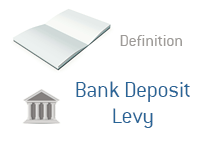Definition of Bank Deposit Levy
What does the term "bank deposit levy" mean? What is the definition of the term "bank deposit levy"?
The term "bank deposit levy" came to the forefront during the negotiations between Cyprus and the "troika" (International Monetary Fund, European Commission, European Central Bank) in March of 2013.
 As part of the bailout for Cyprus, the "troika" insisted on a "bank deposit levy" that would be used to partially fund the bailout.
As part of the bailout for Cyprus, the "troika" insisted on a "bank deposit levy" that would be used to partially fund the bailout. A "Bank deposit levy", or "bank deposit tax", calls for a certain percentage of bank deposits in a certain country to be seized for a certain purpose. In the case listed above, the bank deposits would be used to partially fund the Cyprus bailout.
The initial "bank deposit levy" proposal in Cyprus called for accounts of less than 100k Euros to be "taxed" at a rate of 6.5%, while accounts over 100k would get taxed at a higher amount.
So, under the initial proposal, if you were a Cypriot citizen with your life savings of 50,000 Euros in the bank, you would lose 6.5% (or 3,250 EUR) to the levy.
If you were a foreign business with a bank account in Cyprus, you would also be hit with the levy.
The banks in Cyprus shut down completely until the "bank deposit levy" was voted on, in order to prevent a mad rush of withdrawals from Cypriot banks ahead of the levy. For this reason, the proposed levy was kept top secret in order to prevent a bank run.
--
Davemanuel.com Articles That Mention Bank Deposit Levy:
Cyprus and the Proposed Bank Deposit Levy
